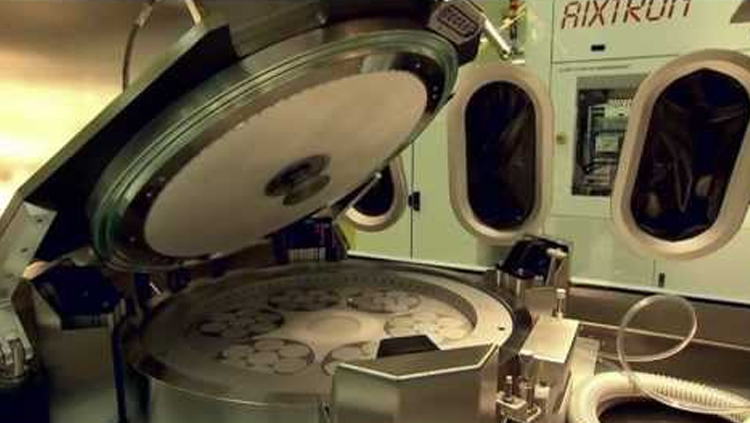OLED consortium funding from German government
Applied Materials, Merck KGaA and the Braunschweig University of Technology (TU-BS) today announced that they have been awarded a grant by Germany’s Federal Ministry of Education and Research (BMBF) to develop processes to lower the cost of manufacturing organic light-emitting diode (OLED) lighting for general illumination applications. Applied will spearhead the three-year project, named Light InLine (LILi), joining forces with Merck, a leading manufacturer of high performance OLED materials and TU-BS, an internationally recognized center for OLED research. Work on the LILi project will be centered at Applied Materials’ advanced development facility in Alzenau, Germany.
Fabricated on sheets of glass, OLED lighting tiles can emit white light that is brighter, more uniform and more energy efficient than fluorescent light fixtures, making them well-suited for ceiling lights in homes and offices. While a number of OLED products have been developed in recent years, key challenges such as limited lifetime and high costs must be addressed for the technology to be widely adopted. The LILi project aims to address these challenges by developing large-area manufacturing processes using high-performance organic materials and efficient device design.
“Solid state lighting is an important component of an energy-efficient future,” said Dr. Mark Pinto, senior vice president, corporate chief technology officer and general manager of Applied’s Energy and Environmental Solutions Organization. “OLED technology aligns well with our equipment used for manufacturing flat panel displays. We’ve already delivered a system that is now in pilot manufacturing at a leading European lighting manufacturer. Through the LILi project, we expect to further optimize this technology to increase the quality and drive down the cost for OLED lighting applications.”
“Merck has a wealth of experience in developing and scaling up the complex organic compounds that are essential for stable and cost-effective OLED manufacturing,” said Dr. Udo Heider, vice president, Liquid Crystals/OLED, Merck KGaA. “The LILi project is a great opportunity for us to test new organic materials with state-of-the-art manufacturing equipment in order to validate their stability and performance on large area substrates.”
“Innovation in OLED technology is one of the primary focuses of our institute,” said Professor Wolfgang Kowalsky from TU-BS. “We’re pleased to partner with Applied Materials and Merck to evaluate how our new high-efficiency OLED lighting device structures will perform in an industrial-scale environment.”
The total cost of the OLED project will amount to approximately €7.49 million, which includes €3.26 million to be provided by the German Federal Ministry of Education and Research and €4.23 million to be contributed by the industry partners. The grant (FKZ 13N10611) is part of the BMBF’s “OLED 2 – Organic Light Emitting Diodes - Phase 2” initiative, which seeks to support OLED collaborative research and encourage OLED manufacturing in Germany.


































